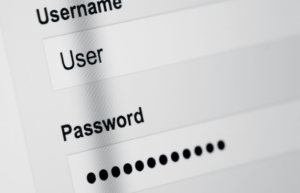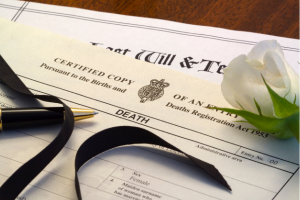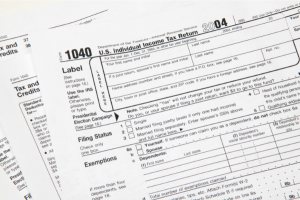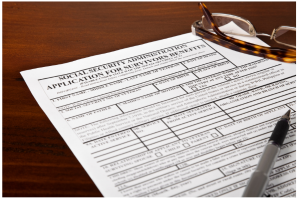
Updated: August 21, 2023
What to Do Within a Few Weeks
Now that you have said goodbye to your loved one, it is time to acknowledge those who have helped and begin to settle your loved one’s affairs. As with previous tasks, it all starts with the paperwork. For example, while arranging permanent custody for dependents and a home for any pets are priorities you may need to refer to the will to know who that will be.
Finances may be a priority and you will want to begin tasks that will ultimately provide income, such as settling your loved one’s estate, notifying life insurance companies, and looking into employee benefits from your loved one’s job. Likewise, if you haven’t already, you may need to contact the Social Security office to stop benefits for your loved one that you would have to pay back.
Other than that, there is no specific order to these tasks.
Look for Important Documents and Paperwork
 You should know where they are stored ahead of time, but common places include home safes or strong boxes, safe deposit boxes in a bank, stored digitally on a computer or the cloud, file cabinets, or even a cardboard box. You may need to find the necessary keys to access the information, such as:
You should know where they are stored ahead of time, but common places include home safes or strong boxes, safe deposit boxes in a bank, stored digitally on a computer or the cloud, file cabinets, or even a cardboard box. You may need to find the necessary keys to access the information, such as:
- Usernames and passwords for any online accounts, including email accounts, financial records, social media accounts, retail sites, such as Amazon, etc.;
- Passwords/PIN numbers to computers, cell phones, and other electronic devices;
- A list of safety deposit boxes, where to find keys, and names of authorized users; and/or
- Combinations to safes.
In order to make and pay for funeral, burial, and/or cremation plans, you will have likely looked at the last will and testament, advance directives, and other documents. However, now you will be looking for all the paperwork that will be needed to settle the estate. The list is long, but your loved one may not have all of them.
Locate documents for payable on death accounts and transfer on death deeds, which are already owned by the beneficiaries and any trust documents in preparation for transferring them to the beneficiaries.
Locate other financial documents, including bank statements, bearer bonds, brokerage statements, deeds, prenuptial agreement, stock certificates, and title documents, assets such as life insurance policies, bank accounts, investment accounts, real estate ownership, retirement accounts, and business ownership, and debts such as mortgages, owed taxes, credit card debt, and unpaid bills.
At this point you will be getting ready to start the probate process and be looking at the instructions in your loved one’s will for distributing their estate.
- In most cases your loved one’s will is already filed with the probate court.
- If they had no will, you should contact your local probate court. They will tell you how to proceed from there.
You or the executor will be seeking any and all documents needed to identify any assets you can use to cover current costs and to calculate the value of your loved one’s estate.
 Insurance policies may become an important source of income and should be located and assessed. You will need access to the premium payment records to do this.
Insurance policies may become an important source of income and should be located and assessed. You will need access to the premium payment records to do this.
The usefulness of the policy will be one of two situations.
- You can get a cash settlement if the premium is paid or could be paid in full to get the settlement. This will usually apply to life insurance or funeral insurance.
- You cannot get a cash settlement if the premium is not paid in full and/or the policy has expired.
There may be other policies that are no longer needed and can be discontinued. These are policies like health, disability, or pension insurance.
A list of all their financial accounts will be needed to help determine the value of the estate and see if there are other assets that can be used for expenses, although most that are not joint accounts may be tied up until the estate is settled. Information should include the most recent statements and the list of beneficiaries.
You will need any deeds, titles, promissory notes, etc. to help determine the value of the estate and transfer them to the beneficiaries.
There may be a whole host of other financial records to find and factor into the estate value. This will include other personal and business assets as well as unpaid bills and other debts.
Many other legal documents may be needed for identification, validation, or authorization when settling their estate, including:
- Social Security card (or number);
- Birth certificates (of all family members);
- Marriage license or certificate;
- Court documents for adoptions and divorce;
- Driver’s license;
- The Death Certificate; and/or
- Passport, citizenship, immigration and/or alien registration papers.
Executors and legal professional will need access to personal information to settle the estate, including names and contact information of closest family and friends with a stake in the estate and all lawyers, accountants, doctors, etc.
For listings of individual documents to look for see After a Death Occurs: A Checklist at Legal Voice website.
Send Thank-you Notes
- From the contact list that you acquired earlier and sign-in books from any visitation/viewing, send thank-you notes and acknowledgements.
- Consider delegating this task to a family member.
Order Several Copies of the Death Certificate
 You’ll likely need anywhere between five to 12 copies (but possibly more), depending on the accounts that your loved one had open and other assets, such as insurance policies, property, benefits, wages, payable on death accounts, and transfer on death deeds.
You’ll likely need anywhere between five to 12 copies (but possibly more), depending on the accounts that your loved one had open and other assets, such as insurance policies, property, benefits, wages, payable on death accounts, and transfer on death deeds.- Your funeral director may be able to help you order them for a fee.
- You can order them yourself from the vital statistics office in the state where the death occurred, the local Department of Health office, or from the city hall or other local records office.
- Each certified record will cost between $10 to $30.
Settle the Estate
Once all the previous tasks have been completed, it is time to begin settling the remaining estate. Your loved one’s private assets will be tied up until this is done, and you will need these assets to move on with your and your family’s lives.
The first step will be to contact everyone that will be involved which may include your attorney and/or accountant, and the executor and/or trustee of your loved one’s estate. The executor of the will or trustee of any trusts are the only one(s) authorized to carry out these steps. If there is no will, the probate court will appoint an administrator, which may be you.
Most of these steps require a copy of your loved one’s death certificate. This can give you an idea of how many you may need just for this process.
Keep records of everything and notify the executor of the estate about the accounts you close, outstanding debts, and withdrawals of cash from any accounts.
Manage Any Trusts
Trusts are handled without involvement of the probate court and can be attended to by your attorney and the trustee working together. You can start the process as soon as you are ready.
Begin the Probate Process
 You or the executor named in the will and the attorney should file a petition for probate with the probate court along with a copy of your loved one’s will. While you can file the petition as soon as you are ready, the approval takes time. States have a waiting period before the probate process can begin, usually one month. Despite this, you should meet with a probate attorney as soon as possible.
You or the executor named in the will and the attorney should file a petition for probate with the probate court along with a copy of your loved one’s will. While you can file the petition as soon as you are ready, the approval takes time. States have a waiting period before the probate process can begin, usually one month. Despite this, you should meet with a probate attorney as soon as possible.
- You may be able to use your loved one’s attorney, who is already familiar with the estate. If not, the executor may also choose an attorney, usually after getting recommendations from family or friends. An online search may be an efficient way to find one.
- Probate can be a complex and time-consuming process. Professional advice and experience can save a lot of time, frustration, and money.
If there isn’t a will, the probate court judge will name an administrator in place of an executor.
The probate process starts with an inventory of all their personal/unshared assets such as property, bank accounts, house, car, brokerage account, personal property, furniture, jewelry, and animals, all of which will need to be filed in the probate court. Trusts, shared, jointly-owned, and transfer-on-death assets are not included.
Deal With Your Loved One’s Debt
Before discussing who to contact about your loved one’s finances and paying bills, it’s important to understand what happens to their debt after they die. There are some important points to keep in mind.
The money for creditors will usually come from the estate. As discussed in the Estate Planning section, availability to creditors differs between states and those assets considered part of the estate and those that are not. Non-estate assets and irrevocable trusts are protected from creditors, while estate assets and Community property, in the 10 states that have this, are not.
Estate Assets | Non Estate Assets |
Every asset in your loved one’s will Any jointly-owned assets without rights of survivorship Any assets where you co-signed the loan or mortgage as the spouse | Most assets that are transferred directly to beneficiaries upon your loved one’s death Any assets that are strictly yours Jointly-owned assets with rights of survivorship IRAs, 401(k)s or other employer sponsored retirement accounts, life insurance, pension plans, and brokerage accounts |
Debtors are first in line to get any money owed to them from available assets and beneficiaries will only be entitled to the remainder. If the debt exceeds the value of the estate, heirs/beneficiaries are not responsible to pay the remainder and the creditors will take a loss. In some cases, medical bills may be an exception.
Student loans will usually be forgiven. Some creditors may be sympathetic about your loved ones death and not seek repayment of the debt.
Notify Any Banks and Mortgage Companies
 In addition to checking/savings accounts with a bank, your loved one may have long-term debts such as home mortgages, bank line of credit, leases, car loans, and student loans from banks and/or mortgage companies.
In addition to checking/savings accounts with a bank, your loved one may have long-term debts such as home mortgages, bank line of credit, leases, car loans, and student loans from banks and/or mortgage companies.
If authorized as the designated agent (usually the executor), ask about any debts, loans, or other money owed to the institution and arrange to have them paid. If you receive any property with a debt such as a home mortgage or a car loan, the debt comes with the property.
- If you co-signed the mortgage loan, you are legally responsible for paying it after your loved one has died. You can continue to pay the loan by taking over the payments, refinance the debt, or sell the property to pay the loan, depending on your preference.
- If you are not a co-signer, you can take over the mortgage if you qualify, even if it is in your loved one’s name without having to immediately pay it off. You will have to refinance any home equity line of credit and be responsible for the loan.
- If you cannot assume or pay off the estate assets, eventually the property itself may be used to pay the balance.
 Change ownership of joint bank accounts, even if you have the right of survivorship. You must take copies of the death certificate to each bank to change ownership of the accounts or ask questions about a deceased loved one.
Change ownership of joint bank accounts, even if you have the right of survivorship. You must take copies of the death certificate to each bank to change ownership of the accounts or ask questions about a deceased loved one.
If you were not a joint owner or co-signer, a personal representative approved by the court will need to authorize you to access the accounts to pay any bills.
You may need a court order to open and inventory a safe deposit box if a key or password isn’t readily available. Most probate courts have administrative rules about steps to access the box of any decedent.
Look Into Employee Benefits
If your loved one was working, contact their employer for information about pension plans, retirement annuities, credit union, accumulated vacation or earned time, health savings accounts, and other benefits, and/or company insurance policies.
- Ask if you are entitled to any of these benefits. You will need a death certificate for each claim you are entitled to.
- If you are not, the payment received for the month of their death may need to be returned/adjusted to account for their date of death.
Contact Credit Card Companies
 The purpose of contacting credit card companies is to ask about your loved one’s debt, to cancel their cards, and change any jointly held cards to individual accounts. As long as your loved one’s cards are active automatic renewals will continue and the account is vulnerable to identity fraud and theft.
The purpose of contacting credit card companies is to ask about your loved one’s debt, to cancel their cards, and change any jointly held cards to individual accounts. As long as your loved one’s cards are active automatic renewals will continue and the account is vulnerable to identity fraud and theft.
- Examine your loved one’s mail, wallet, and any online accounts to identify open credit card accounts.
- For each card, call the customer service phone number on the card, monthly statement, or issuer’s website. Before you call, read all the statements to try and find out what your financial responsibilities are after the death of your spouse.
- Ask about any payments due on the card and, if the charges are valid, make arrangements to have them paid.
- Like other forms of debt, the money is paid out to the credit card companies from the estate before the beneficiaries receive any assets. If there isn’t enough in the estate to pay the debt, the credit card company has to write it off.
- Unless you were a co-signer or joint owner of the account, you are not responsible to pay any debts with your personal money. Those who were authorized users only are not responsible for paying the credit card debt.
- Tell the agent that you would like to close the account of a deceased relative. A death certificate will be requested, which you can provide by email, mail, or fax. It may be safer to send the death certificate by registered mail with return receipt requested.
- Once the company receives the death certificate, it will close the account as of the date of your loved one’s death.
- If an agent doesn’t offer to waive interest or fees after that date, be sure to ask.
Identify and Pay Other Important Bills
After you have contacted the banks and credit card companies you may have a good idea how much debt your loved one had, but there are many other possible debts.
Look for and notify other lenders that any accounts held in your spouse’s name alone should be closed, and/or if you have joint accounts that your spouse is now deceased. Lenders will report your spouse as deceased when they send their next account update to the credit bureaus.
 You should notify federal, state and local officials, landlords, rental agencies, utility companies, and administration offices for assisted living or nursing homes as soon as possible. You may need to discuss debts, rental payments, lease/rental agreements, ongoing expenses for services, and outstanding taxes.
You should notify federal, state and local officials, landlords, rental agencies, utility companies, and administration offices for assisted living or nursing homes as soon as possible. You may need to discuss debts, rental payments, lease/rental agreements, ongoing expenses for services, and outstanding taxes.
- Make a list of bills that are likely to be due. Some will need to be paid, some may only be due for the last month of your loved one’s life, and others will continue if you still need the residence, item, or service being provided.
- You may be able to track them down via your loved one’s mail, online accounts, files on their computer, and/or stored paper documents.
- There are many types to look for, including:
- Utility bills — may include electricity, heat, telephone, cable TV, internet/Wi-Fi, cell phones, and/or water/sewer/garbage;
- Rental payments — may still need to be paid for the month your loved one died on their home, automobile, apartment, assisted living facility, or nursing home; and/or
- Property taxes, if paid separately and not included in home mortgage.
- If it is not you, share the list with the executor or estate administrator so that bills can be paid promptly.
- Set up a plan to ensure bills will be or will continue to be paid on time.
Notify Life and Other Insurance Companies
Your loved one may have had many types of insurance that will help you financially once they are settled. They may be life insurance or annuities that will pay a benefit to you as the beneficiary or mortgages, credit cards, or other loan insurance that may pay for the debts directly.
- Make sure you check all of their records, since these institutions may not know to notify you about the benefits.
- Fill out each claim form for all insurance policies. It will likely take time to process them. Each claim form will require a copy of the death certificate.
- If your loved one was listed as a beneficiary on any of your policies, arrange to have their name removed. Friends and family who may have listed your loved one on their own life insurance policies should as well.
 There will likely be many insurance policies that your loved one no longer needs.
There will likely be many insurance policies that your loved one no longer needs.
- This could include health and dental insurance, car/vehicle insurance, homeowners or property insurance, income and/or disability insurance, or any other accident insurance.
- Depending on the policy, reach out to either the insurance company or your loved one’s employer to stop coverage.
- Cancel them and ask for any unused premium to be returned to you, unless they owed the insurance company for late premiums or services.
- Insurance bills may still need to be paid for the month your loved one died. This may include the life insurance premium before you’re able to receive any settlement.
- A copy of the death certificate will be needed to cancel each one.
Contact All Financial Advisors or Brokers
In locating all of your loved one’s assets, you may have to find and speak with any financial professionals they have used to identify any additional financial and investment accounts that they may have held. Unless it is you, the executor may not need to be involved if there are no complications. They will go over these accounts with you and can help you manage them.
- Determine the beneficiary listed on these accounts.
- Work with each advisor to transfer ownership of the accounts they manage to the beneficiary.
- Depending on the type of asset, it may not need to be part of the probate process. The beneficiary could get access to the account or its benefits by filling out the appropriate forms and providing a copy of the death certificate.
File Your Loved One’s Final Tax Return
 They say the only certain things in life are death and taxes. This includes taxes after death. You and/or the executor must file a final tax return for the year your loved one dies.
They say the only certain things in life are death and taxes. This includes taxes after death. You and/or the executor must file a final tax return for the year your loved one dies.
- You’ll need to file a return for both your loved one based on their income over that time, and the estate.
- In addition to all of the other records needed to complete a tax return, you will need the monthly bank statements on all individual and joint accounts showing the account balances on the day of your loved one’s death.
- Information about Probate, Filing Estate and Individual Returns, Paying Taxes Due can be found on the Internal Revenue Service website.
Deal With Your Loved One’s Possessions
Probably the last part of the estate that will be dealt with is your loved one’s possessions. It can be a very emotionally taxing task. Everything you see can evoke a memory, some of which may be painful. Some may cause guilt when you discard them, even if the item will not be useful to anyone.
It can be time consuming and will most likely take multiple sessions to complete. It may be better to do the task with another family member to reduce your workload, support you, and help you make decisions about items.
Like everything else in this section, it is better if you planned ahead. Not only will you know what items need to be taken into account, you may know where your loved one wants them to go and get a head start on distributing them.
 There are many options for each item depending on whether your loved one wanted to hand it down to a specific person, how valuable the item may be, each item’s meaning to the family or friends, or the situation you find yourself in after their death.
There are many options for each item depending on whether your loved one wanted to hand it down to a specific person, how valuable the item may be, each item’s meaning to the family or friends, or the situation you find yourself in after their death.
- Save for yourself – you will probably want to keep any items that will be of use to you, such as a car or appliances. Things of little value, such as partially used items like toiletries and cleaning solutions, and plastic containers can usually be easily dispensed with.
- Give to family or friends – having conversations with family and friends about individual items they may be interested in can help you decide which of them would eventually receive those items.
- Sell it – you may want to or need to sell various items.
- Donate it – consider donating clothes, household items, and motorized vehicles that are in good shape and no longer needed.
- American Red Cross, Goodwill, AMVETS, Habitat for Humanity, Disabled Veterans – cars, Charity Navigator – cars and other possessions, and freecycle.org can be helpful in these situations.
- There may be local organizations that accept donations such as homeless shelters, churches, thrift stores, or community outreach centers. Some may be able to pick them up. The same is also true of non-perishable food.
- Websites listing organizations that will accept clothing donations include 15 Places To Donate Gently-Worn Clothes And Unused Beauty Products (Huffington Post), These Are the Best Places to Donate Clothes (Green Matters), Where to Donate Used or Old Clothes to Charity (Money Crashers), and Where to Donate Your Clothes: National and Local Charities (Public Goods).
- Toss it – there will be items you just want to get rid of, although the decision for some may be harder than you think. If in doubt, keep it for now.
— Although a daunting task, there are ways to approach it in a less chaotic manner.
Although a daunting task, there are ways to approach it in a less chaotic manner.
- Start with a quick scan of the items to determine the scale of your project. Look for any that need to be prioritized, such as houseplants or very expensive items that should not be left in an empty house/apartment/room.
- Do an inventory of the remaining items, along with their location. You may be able to do this more gradually and at your own pace with these items, unless there is a reason to hurry such as a lease running out. However, in this case you can move everything and still be able to go at your own pace.
- You should decide on some organized approach, such as by room or item description — food, clothes, books, art, etc. Keep a list as you go to prevent sorting items more than once.
- Evaluate each item and tentatively decide on which categories they go in, their condition and value, where they will go, and start to plan how to follow through.
- Put anything that doesn’t work, is in poor shape, or too old in the throw away pile.
- Trust yourself about the sentimental value of each item and whether that alone is a reason to keep it.
- Make sure items to be given away can realistically be taken and used. There is no need to make space or purchase storage to keep items that you or your family will never use.
Other items may have aesthetic value, like a painting or jewelry, or be valuable for other reasons, such as antique furniture or a coin collection. Many antiques and art items may not have a lot of intrinsic value. Sometimes a professional appraiser can help.
Consider giving items to an organization that will find someone who could use the item if you or your family can’t. Whether you want to sell or donate items is usually based on preference or need.
- Consider selling items if you need the money, selling only expensive items and donating the rest, or donating everything if you can afford to or there are no expensive items.
- Options on selling include an estate sale, eBay or similar site, dealers, or organizations that specialize in this.
- There are many options for donations, many of which depend on what you are donating and what causes you support.
- Sorting Through a Loved One’s Belongings After a Death has information on a number of resources to look at.
Other Things To Do
 There are many other tasks you will need to do. Some will involve checking and applying for any death or survivor benefits to help you out financially, closing out your loved one’s affairs, notifying agencies about their death, and even checking for any evidence of identity theft.
There are many other tasks you will need to do. Some will involve checking and applying for any death or survivor benefits to help you out financially, closing out your loved one’s affairs, notifying agencies about their death, and even checking for any evidence of identity theft.
The executor of their will may be the only one authorized to carry out some of these steps. A copy of your loved one’s death certificate will be needed for many of them. Those tasks that require a death certificate are identified to give you an idea of how many copies you may need.
If your loved one has frequent-flier or frequent-buyer programs with points, contact the company and ask if they can be transferred to you or another beneficiary or family member.
Contact Medical Insurance and Healthcare Providers
If your loved one received Medicare, Social Security will inform the program of the death. If they had been enrolled in Medicare Prescription Drug Coverage (Part D), Medicare Advantage plan or had a Medigap policy, contact these plans at the phone numbers provided on the plan membership card(s) to cancel the insurance. For other types of health insurance contact either their employer or contact the plan at the phone numbers provided on the plan membership card.
Contact healthcare providers to cancel any medical, therapy, or dental visits that are scheduled or happen on a regular basis. This includes pharmacies or other sources of prescription drugs, visiting nurses, home health aides and social workers, and providers of durable health equipment.
Stop any home care services that your loved one may have been receiving, such as meal delivery, home care by a visiting nurse, physical therapist, social worker, or aid and other services.
Stop Any Utilities
 If the residence will no longer be lived in, make sure that all of the utilities are shut off. This will require some additional steps if this happens during the winter to prevent damage from frozen pipes.
If the residence will no longer be lived in, make sure that all of the utilities are shut off. This will require some additional steps if this happens during the winter to prevent damage from frozen pipes.
If you are keeping a shared phone service, consider removing your loved one’s voice from outgoing messaging or answering machines.
Notify Credit Reporting Agencies
Once you have canceled their credit cards, it is good to keep track for a time to be sure online predators have not gotten a hold of the information and purchased anything with it.
- Consider contacting and signing up with a credit bureau such as Equifax, Experian, or TransUnion. These organizations will flag your spouse’s credit report to help minimize the chances of identity theft. The Social Security Administration (SSA) periodically sends them lists of newly deceased people and they may contact you.
- In order to access any information about your loved you will need to provide them with your spouse’s legal name, Social Security number, date of birth, date of death and copies of the death certificate, along with your name, mailing address, and a copy of your driver’s license or other government-issued identification.
- If the executor of your spouse’s estate is notifying them, they should provide a copy of their government-issued identification and a copy of the will, executor agreement or power of attorney documentation to prove they are authorized to act on behalf of your spouse’s estate.
It’s a good idea to check your loved one’s credit history a month or two after their death to confirm that no new accounts have been opened in their name.
Cancel Your Loved One’s Driver’s License
Once their license is canceled, the information is no longer available to use for identity theft.
- Go online or call your state’s DMV for instructions.
- Have a copy of the death certificate ready.
Cancel Subscriptions
Not only are periodicals no longer needed, their accumulation in the driveway is a sign that your loved one’s residence is unoccupied.
- Look around the house for any newspapers, magazines, etc, to cancel.
- Check online for bills or notifications, and any e-subscriptions they may have.
- Check within the publication or online for steps to take to cancel them.
See The Digital World section for details on accessing and stopping online subscriptions.
Cancel Any Other Deliveries
 Look at printed or online messages to see if there are any deliveries coming, such as from Amazon. The same is true for any routine deliveries, such as pet food or prescriptions. Packages accumulating outside the residence can be an announcement that it is unoccupied.
Look at printed or online messages to see if there are any deliveries coming, such as from Amazon. The same is true for any routine deliveries, such as pet food or prescriptions. Packages accumulating outside the residence can be an announcement that it is unoccupied.
Look at Online Accounts
Your loved one’s email and other online accounts contain a wealth of information about many important things, such as bills, accounts, subscriptions, memberships, and personal correspondence. Keep them open for a while, until you are sure you have all the relevant information.
See The Digital World section for details on managing and closing online accounts.
Notify Organizations
Reach out to professional organizations your loved one belonged to inform them and find out how to change their membership status. Consider sending notifications to other organizations your loved one is associated with, such as universities, societies, fraternities or sororities, etc. to inform them and to stop any notifications and journals they are sending.
Greek fraternal organizations may want to hold a special ceremony for your loved one, while other organizations may have an alumni publication that could inform classmates and other alumni of their death.
Notify the Election Board
According to a 2012 Pew Center report, almost 2 million people on voter registration rolls are dead. Removing your loved one from the voter registry helps reduce the risk of voter fraud in your area.
Update Your Will
Your deceased loved one may be part of your will and their death could affect it. If you do not make the necessary changes, your will may become invalid and be subject to the laws of intestate succession. Avoid this by updating your will to fit your current situation.
- Amend P. What Happens to Your Debts After You Die?. AARP website. Updated: April 8, 2022. Accessed: August 21, 2023.
- Axelton K. How to Handle Credit and Debt After the Death of a Spouse. Expirian website. Posted: December 15, 2020. Accessed: August 21, 2023.
- Gill S. What to Keep When Someone Dies. modern loss website. Published: November 20, 2017. Accessed: Accessed: August 21, 2023.
- Kaminsky M. 7 Tips for Getting Rid of Your Parents’ Lifelong Possessions. legalzoom website. Updated: May 11, 2023. Accessed: Accessed: August 21, 2023.
- Kaminsky M. What Happens to Credit Card Debt When You Die? legalzoom website. Updated: May 11, 2023. Accessed: Accessed: August 21, 2023.
- Sember B. What Happens to Debt When You Die? legal zoom website. Updated: May 11, 2023. Accessed: Accessed: August 21, 2023.
- The Most Common Household Issues After A Death. everplans website. Accessed: Accessed: August 21, 2023.
- Williams L. Sorting Through a Loved One’s Belongings After a Death . What’s Your Grief website. Accessed: August 21, 2023.
